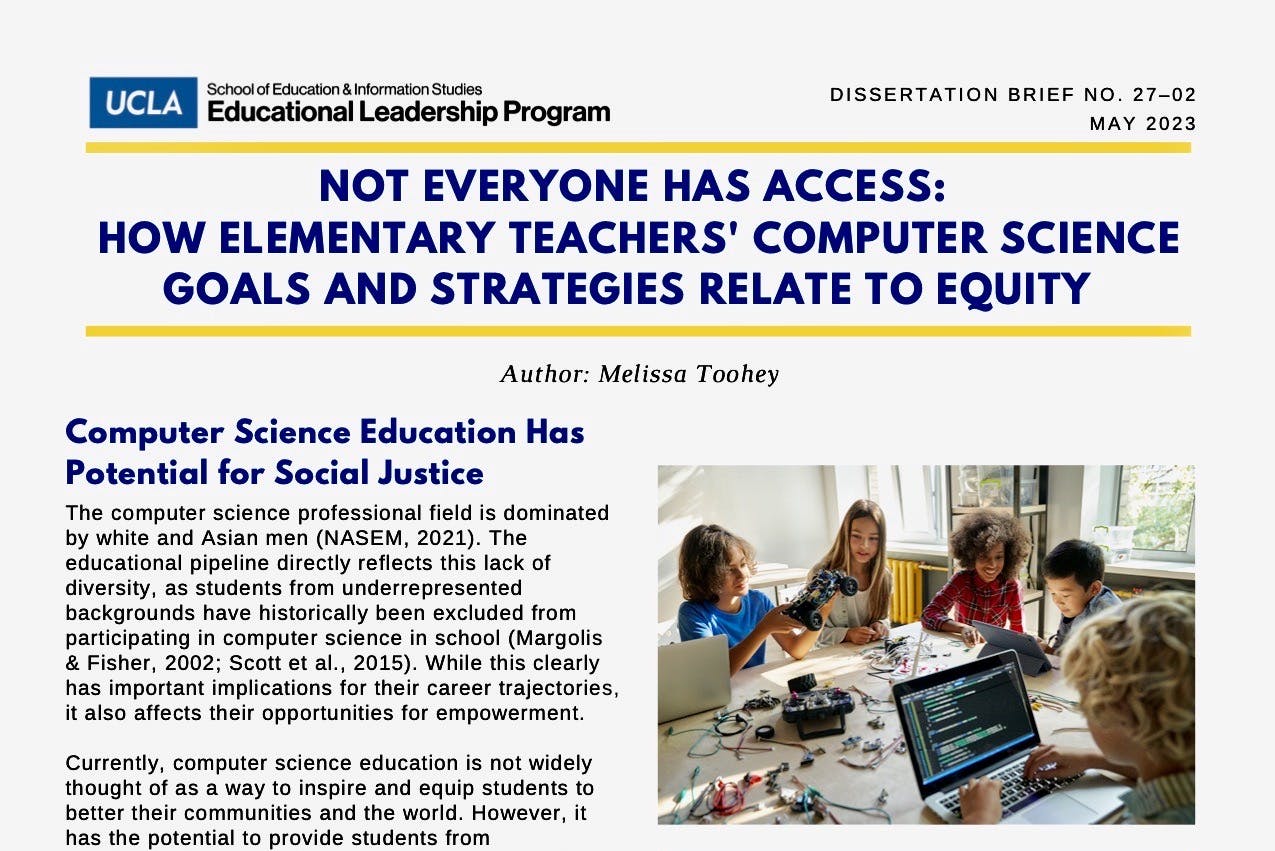Study highlights strategies teachers use to make their practices more equitable
In 2015, Melissa Toohey was an elementary school teacher in South LA who unexpectedtly found herself teaching coding and engineering to young students. In the mornings, she also taught guided reading. One of her kindergarten students had been classified with developmental delays and had speech difficulties and was the lowest performer in her reading and mathematics groups. But as Toohey worked with the young girl to learn about computer science, she turned out to be her best coder.
“It really made me shift my mindset around what school does for students, how it serves students, how we highlight strengths of students, how we determine what strengths are, and how we determine what a good student is,” Toohey says. “Because in any traditional sense, this young girl struggled with education. But when it came to coding, she was my strongest coder. It made me question my biases and rethink my approach, my pedagogy, and my teaching.
“I think that is when I bought into teaching computer science as a tool for equity. If she (the student) didn’t have that access to computer science, she would have been locked out, and would never have been able to discover her strengths. That was when I first got really interested in looking at how teachers think about equity.”
Fast forward to this year and Toohey, a 2022 doctoral graduate of the UCLA Educational Leadership Program, has published an ELP Dissertation Brief exploring how elementary school computer science teachers think about equity and the strategies they use to make their practices more equitable.
“Computer science is powerful content that students need. It opens up economic and job opportunities and empowers students with tools and skills to be able to create and improve their roles in their community,” Toohey says. “But inequities are already built into how students are accessing computer science education.”
For the study, “Not Everyone Has Access: How Elementary Teachers’ Computer Science Goals and Strategies Relate to Equity,” Toohey interviewed 20 elementary school computer science teachers from across the country about their goals for instruction and students, as well as about their definitions of equity. Their responses were mapped onto the National Academies of Science, Engineering and Medicine definition of equity in computer science. Toohey also used the Kapor Center’s Reimagining Equitable Computer Science Framework to understand the teachers’ responses. The framework defines key elements of equity in computer science, such as acknowledging racism and enacting anti-racist practices, or creating inclusive and equitable classroom cultures.

Toohey’s findings make clear that teachers recognize the lack of diversity in computer science and are thinking and talking about equity in computer science in terms of access and opportunities. But teachers were not discussing equity in computer science instruction in terms of the domination of white culture in the field and how computer science may be impacted by racism or its role in exploring cultural perspectives and the pursuit of social justice.
“I think teachers recognize that there is racism and bias in computer science and technology. But they weren’t necessarily integrating it into their teaching or making it part of their teaching practice,” Toohey says.
Toohey’s analysis of the teachers’ reflections on the Kapor Center framework finds they have generally considered the components of the equity framework in their teaching and have varying degrees of use in their teaching practices. The teachers also discussed creating cross-curricular connections as an important strategy for increasing equity—something that is not explicitly included in the Kapor Center framework. Most of the teachers had not leveraged computer science instruction to increase achievement in core content areas.
“Teachers value equity, they’re prioritizing it,” Toohey says. “But there’s more that can be done. Right now, we are just scratching the surface.”
Toohey’s brief offers recommendations for equitable practices with a focus on the need to build teacher awareness of racism in computer science, and to provide concrete strategies to address it. The brief also encourages efforts to assist teachers to connect computer science with core subjects.
“There are so many more elements of what policymakers and teachers and parents can do to ensure that every child has access to computer science education and that there is equity in the field. I would hope there would be a comprehensive strategy for decision-makers and policymakers to enact so that no kids are left behind.
“And I hope teachers can transform computer science education by infusing equity into their computer science practice. It benefits all of our students.”
“Not Everyone Has Access: How Elementary Teachers’ Computer Science Goals and Strategies Relate to Equity” is part of a series of dissertation briefs published by the UCLA Educational Leadership Program. The full brief, including key findings and recommendations, is available here.
